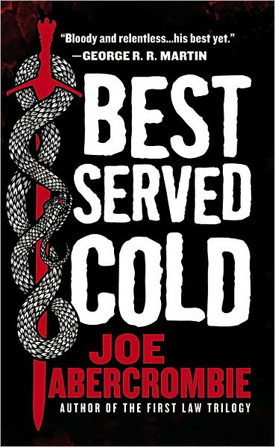If you’ve read Joe Abercrombie’s The First Law trilogy, there are some characters in his next novel, Best Served Cold, you’ll recognize, and the names of some of the countries and cities they visit will be familiar to you. If you aren’t familiar with his work, though, this is still an excellent jumping-on point, a sprawling tour of one of the most anti-heroic worlds in modern fantasy.
?While The First Law was propelled by an assortment of interlocking power schemes, Best Served Cold is at heart a straightforward revenge story.
Abercrombie makes no secret about drawing the basic inspiration for the novel’s plot structure from the classic Lee Marvin film Point Blank, although you could also look to Quentin Tarantino’s Kill Bill as a template. Here’s the basics: Monza Murcatto, an eminently successful mercenary commander, is summoned to the palace of her patron, the Grand Duke Orso, where, after witnessing the death of her second-in-command (who also happens to be her brother) she’s garroted, stabbed, and then thrown off the balcony to fall down the side of a mountain. Somehow, she survives all that, and dedicates herself to killing the seven men who took part in the attempted double murder.
Abercrombie’s action-movie pacing is at its finest here, as he sets up a chain of assassinations that raises the bar each and every time. How do you top the murder of a prominent banker in the center of his heavily guarded offices? Go for one of the duke’s sons in a bordello during the middle of a private orgy, then sneak into a besieged city so you can take a crack at the general of the invading army, and then…
Of course, most readers probably have some idea whether or not Monza’s going to fulfill her goals or not, so the story needs something more to keep us in full suspense, and this is where Abercrombie deploys his supporting cast to maximum effect. We come for the revenge, but we stay for the moral transformation of Caul Shivers, a Northman Monza hires as the first of several henchmen, or the reawakening of Nicola Cosca, the ex-soldier of fortune she betrayed to take the job leading the Grand Duke’s troops. We may see some of the double crosses coming, but even the most attentive reader will be surprised by the twists Abercrombie introduces in the second half of the story.
?Some critics have accused Abercrombie of “bankrupt nihilism,” and on a superficial level it’s easy to see why: Best Served Cold doesn’t just underscore the anti-heroism of Monza’s quest for vengeance, it makes a point of rubbing our faces in the collateral damage of its pointlessness. Apart from a few fleeting glimpses of children, the closest the novel’s characters come to innocence are a spineless noble and a possibly autistic hired thug. In Abercrombie’s world, people don’t just become jaded to violence, they learn to punctuate it with dark irony.
Here’s the thing, though: Abercrombie doesn’t ask readers to revel in this bloodshed. Yes, there’s a visceral thrill when Monza checks another name off her list—the first few times, anyway—but Abercrombie always reminds us each of those successes comes at a great cost to Monza and to those around her. “You make yourself too hard,” she tells herself after one killing, “you make yourself brittle too. Crack once, crack all to pieces.”
There’s a Joseph Brodsky line Abercrombie quotes in The Blade Itself: “Life—the way it really is—is a battle not between good and bad, but between bad and worse.” With a few exceptions for “trying to be good,” that statement holds true for just about all of Abercrombie’s fiction, and it’s especially true of Best Served Cold.
Ron Hogan is the founding curator of Beatrice.com, one of the first websites to focus on books and authors. Lately, he’s been reviewing science fiction and fantasy for Shelf Awareness.











I thought this series of “Firsts in Fantasy” for was for new(er) readers to the epic fantasy genre looking to know what to read after A Song of Ice and Fire. I can’t disagree more with “Best Served Cold” as an entrypoint to the works of Joe Abercrombie. I can’t imagine picking this book up as my first fantasy read after ASOIAF and actually making it through the book. “Best Served Cold” is bleak and dark and challenging even for regular readers of fantasy. I enjoy Abercrombie’s work and had a hard time finishing it. The unrelenting violence and complete lack of redemption or positive growth for any of the characters was a turn-off for me and I would expect it would be even more offputting for a fantasy newcomer.
“The Hereos” would be a much better introduction to fantasy beyond ASOIAF, and Abercrombie in particular, for a fantasy newcomer. The action is contained to a single battlefield over a short period of days. The characters and world are fully-realized and complex, but the reader isn’t forced to recall years of history and entire continents of geography. And Abercrombie offers glimpses of hope throughout the novel and allows several of the characters to at least attempt to grow in a positive direction over the course of the novel instead of devolving like those in “Best Served Cold.”
I had given up on Abercrombie as too dark for me to enjoy after “Best Served Cold” and only picked up “The Heroes” because of numerous glowing reviews and finding nothing else of interest at my bookstore. Now, I’m back on the Abercrombie bandwagon and eagerly awaiting his upcoming fantasy/western hybrid. However, if I were to make any recommendation about “Best Served Cold,” it would be to skip it and just enjoy “The Heroes” and the First Law Trilogy on their own.